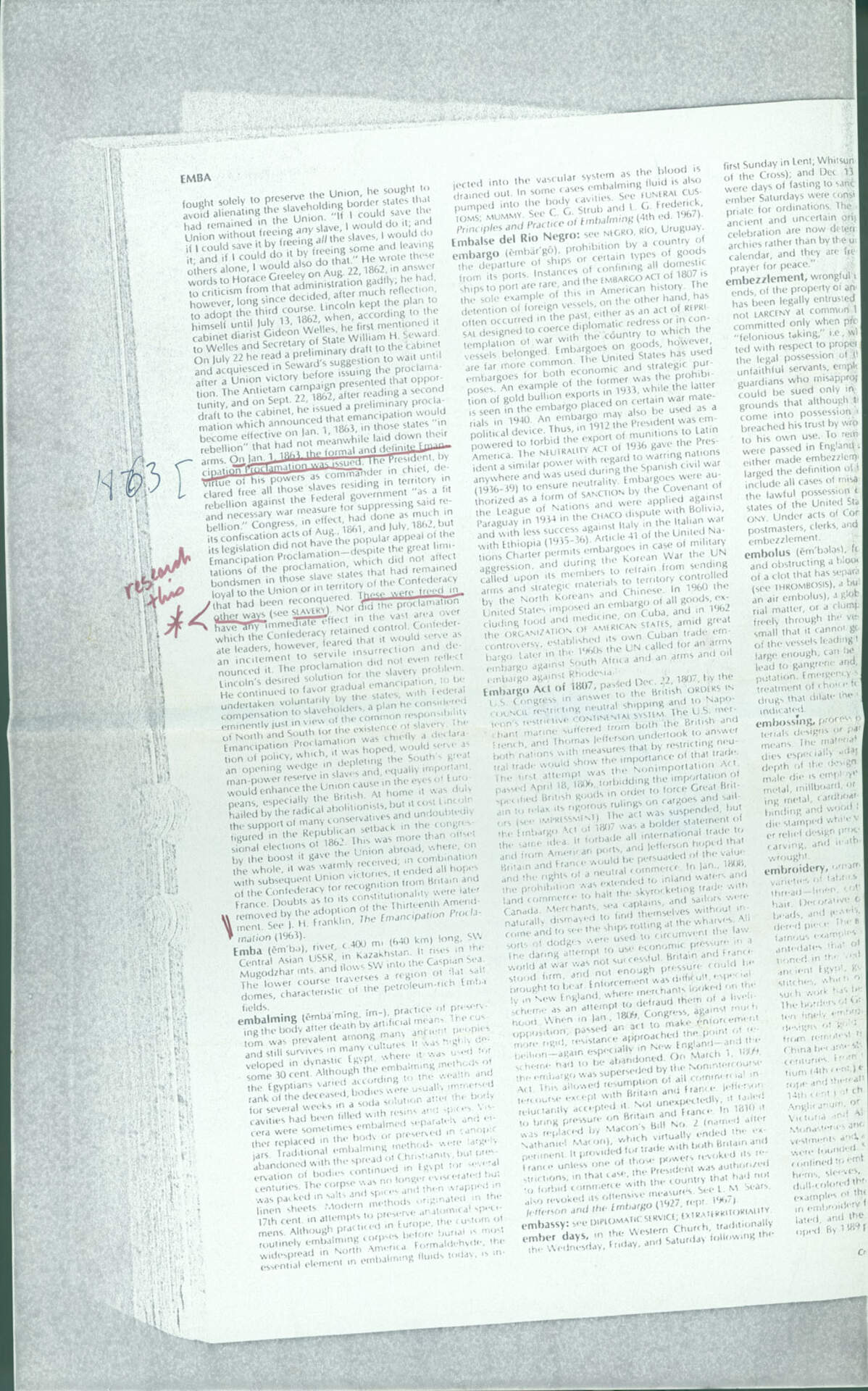Paul Sharits (1943-1993)EMBA
Coped article on paper with annotations
14 x 8 1/2 inches
Gift of Christopher and Cheri Sharits, 2006
{Emancipation Proclamation}
fought solely to preserve the Union, he sought to avoid alienating the slaveholding border states that had remained in the Union. “If I could save the Union without freeing any slave, I would do it; and if I could do it by freeing some and leaving others alone I would do that.” He wrote these words to Horace Greeley on Aug 22, 1862, in answer to criticism from that administration gadfly; he had, however, long since decided, after much reflection, to adopt the third course. Lincoln kept the plan to himself until July 13, 1862, when, according to the cabinet diarist Gideon Welles, he first mentioned it to Welles and Secretary of State William H Seward. On July 22 he read a preliminary draft to the cabinet and acquiesced in Seward’s suggestion to wait until after a Union victory before issuing the proclamation. The Antietam campaign presented that opportunity, and on September 22, 1862, after reading a second draft to the cabinet, he issued a preliminary proclamation which announced that emancipation would become effective on January 1, 1863, in those state’s “in rebellion” that had not meanwhile laid down their arms. On January 1 1863, the formal and definite Emancipation Proclamation was issued. The president, by virtue of his powers as commander in chief, declared free all those slaves residing in territory in rebellion against the Federal government “as a fit and necessary war measure for suppressing said rebellion.” Congress, in effect, had done as much in its confiscation acts of August 1861, and July 1862, but its legislation did not have the popular appeal of the Emancipation Proclamation—despite the great limitations of the proclamation, which did not affect bondsmen in those slave states that had remained loyal to the Union or in territory of the Confederacy that had been reconquered. These were freed in other ways [research this] (see SLAVERY). Nor did the proclamation have any immediate effect in the vast area over which the Confederacy retained control. Confederate leaders, however, feared that it would serve as an incitement to servile insurrection and denounced it. The proclamation did not even reflect Lincoln’s desired solution for the slavery problem. He continued to favor gradual emancipation, to be undertaken voluntary by the states, with Federal compensation to slaveholders, a plan he considered eminently just in view of the common responsibility eminently just in view of the common responsibility of North and South for the existence of slavery. The Emancipation Proclamation was chiefly a declaration of policy, which, it was hoped, would serve as an opening wedge in depleting the South’s great man-powered reserve in slaves and, equally important, would enhance the union cause in the eyes of Europeans, especially the British. At home it was duly hailed by the radical abolitionists, but it cost Lincoln the support of many conservatives and undoubtedly figured in the Republican setback in the congressional elections of 1862. This was more than offset by the boost it gave the Union victories, it ended all hopes of the Confederacy for recognition from Britain and France. Doubts as to its constitutionality were later removed by the adoption of the Thirteenth Amendment. See J. H. Franklin, The Emancipation Proclamation (1963).


